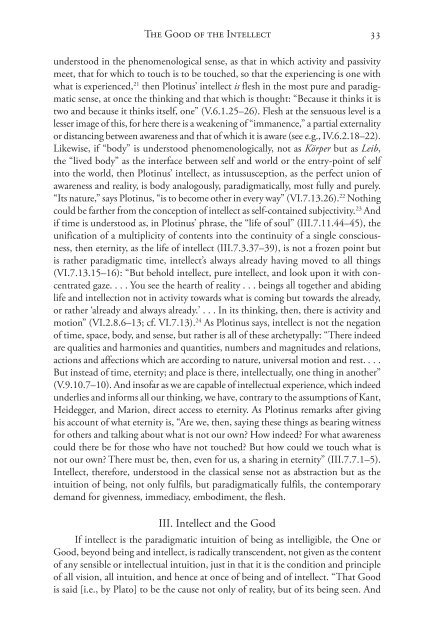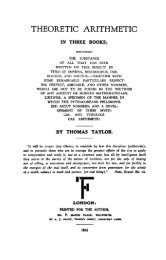Perl - The Good of the Intellect.pdf - Platonic Philosophy
Perl - The Good of the Intellect.pdf - Platonic Philosophy
Perl - The Good of the Intellect.pdf - Platonic Philosophy
Create successful ePaper yourself
Turn your PDF publications into a flip-book with our unique Google optimized e-Paper software.
<strong>The</strong> <strong>Good</strong> <strong>of</strong> <strong>the</strong> <strong>Intellect</strong> 33<br />
understood in <strong>the</strong> phenomenological sense, as that in which activity and passivity<br />
meet, that for which to touch is to be touched, so that <strong>the</strong> experiencing is one with<br />
what is experienced, 21 <strong>the</strong>n Plotinus’ intellect is flesh in <strong>the</strong> most pure and paradigmatic<br />
sense, at once <strong>the</strong> thinking and that which is thought: “Because it thinks it is<br />
two and because it thinks itself, one” (V.6.1.25–26). Flesh at <strong>the</strong> sensuous level is a<br />
lesser image <strong>of</strong> this, for here <strong>the</strong>re is a weakening <strong>of</strong> “immanence,” a partial externality<br />
or distancing between awareness and that <strong>of</strong> which it is aware (see e.g., IV.6.2.18–22).<br />
Likewise, if “body” is understood phenomenologically, not as Körper but as Leib,<br />
<strong>the</strong> “lived body” as <strong>the</strong> interface between self and world or <strong>the</strong> entry-point <strong>of</strong> self<br />
into <strong>the</strong> world, <strong>the</strong>n Plotinus’ intellect, as intussusception, as <strong>the</strong> perfect union <strong>of</strong><br />
awareness and reality, is body analogously, paradigmatically, most fully and purely.<br />
“Its nature,” says Plotinus, “is to become o<strong>the</strong>r in every way” (VI.7.13.26). 22 Nothing<br />
could be far<strong>the</strong>r from <strong>the</strong> conception <strong>of</strong> intellect as self-contained subjectivity. 23 And<br />
if time is understood as, in Plotinus’ phrase, <strong>the</strong> “life <strong>of</strong> soul” (III.7.11.44–45), <strong>the</strong><br />
unification <strong>of</strong> a multiplicity <strong>of</strong> contents into <strong>the</strong> continuity <strong>of</strong> a single consciousness,<br />
<strong>the</strong>n eternity, as <strong>the</strong> life <strong>of</strong> intellect (III.7.3.37–39), is not a frozen point but<br />
is ra<strong>the</strong>r paradigmatic time, intellect’s always already having moved to all things<br />
(VI.7.13.15–16): “But behold intellect, pure intellect, and look upon it with concentrated<br />
gaze. . . . You see <strong>the</strong> hearth <strong>of</strong> reality . . . beings all toge<strong>the</strong>r and abiding<br />
life and intellection not in activity towards what is coming but towards <strong>the</strong> already,<br />
or ra<strong>the</strong>r ‘already and always already.’ . . . In its thinking, <strong>the</strong>n, <strong>the</strong>re is activity and<br />
motion” (VI.2.8.6–13; cf. VI.7.13). 24 As Plotinus says, intellect is not <strong>the</strong> negation<br />
<strong>of</strong> time, space, body, and sense, but ra<strong>the</strong>r is all <strong>of</strong> <strong>the</strong>se archetypally: “<strong>The</strong>re indeed<br />
are qualities and harmonies and quantities, numbers and magnitudes and relations,<br />
actions and affections which are according to nature, universal motion and rest. . . .<br />
But instead <strong>of</strong> time, eternity; and place is <strong>the</strong>re, intellectually, one thing in ano<strong>the</strong>r”<br />
(V.9.10.7–10). And ins<strong>of</strong>ar as we are capable <strong>of</strong> intellectual experience, which indeed<br />
underlies and informs all our thinking, we have, contrary to <strong>the</strong> assumptions <strong>of</strong> Kant,<br />
Heidegger, and Marion, direct access to eternity. As Plotinus remarks after giving<br />
his account <strong>of</strong> what eternity is, “Are we, <strong>the</strong>n, saying <strong>the</strong>se things as bearing witness<br />
for o<strong>the</strong>rs and talking about what is not our own? How indeed? For what awareness<br />
could <strong>the</strong>re be for those who have not touched? But how could we touch what is<br />
not our own? <strong>The</strong>re must be, <strong>the</strong>n, even for us, a sharing in eternity” (III.7.7.1–5).<br />
<strong>Intellect</strong>, <strong>the</strong>refore, understood in <strong>the</strong> classical sense not as abstraction but as <strong>the</strong><br />
intuition <strong>of</strong> being, not only fulfils, but paradigmatically fulfils, <strong>the</strong> contemporary<br />
demand for givenness, immediacy, embodiment, <strong>the</strong> flesh.<br />
III. <strong>Intellect</strong> and <strong>the</strong> <strong>Good</strong><br />
If intellect is <strong>the</strong> paradigmatic intuition <strong>of</strong> being as intelligible, <strong>the</strong> One or<br />
<strong>Good</strong>, beyond being and intellect, is radically transcendent, not given as <strong>the</strong> content<br />
<strong>of</strong> any sensible or intellectual intuition, just in that it is <strong>the</strong> condition and principle<br />
<strong>of</strong> all vision, all intuition, and hence at once <strong>of</strong> being and <strong>of</strong> intellect. “That <strong>Good</strong><br />
is said [i.e., by Plato] to be <strong>the</strong> cause not only <strong>of</strong> reality, but <strong>of</strong> its being seen. And
















